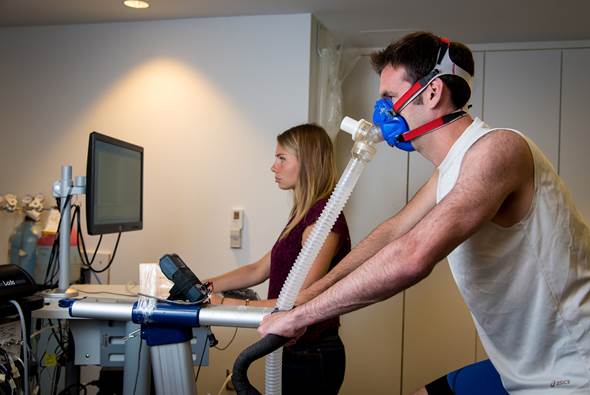Ingesting the ketone monoester supplement before exercise increased blood ketone levels in 30 minutes.
September 1, 2020
Devin G McCarthy, PhD Student
Department of Kinesiology, McMaster University, Hamilton, ON, Canada
This month’s article is written by Devin McCarthy. Devin is a PhD student at McMaster University in the Human Performance lab and supervised by Dr. Martin Gibala. Devin is a current CSEP member and has previous experience in journalism that includes two years with the Students Communicating Research in Biology Education (SCRIBE) program at the University of Guelph.
Take home message
- Ingesting the ketone monoester (KE) supplement before exercise increased blood ketone levels in 30 minutes.
- Drinking the KE before exercise made the blood more acidic but did not affect muscle substrate (carbohydrate and fat) breakdown during exercise nor high intensity cycling and sprint performance.
- The relatively new and still emerging research field of ketone supplementation and exercise is not definitive and practitioners should be cautious recommending this supplement to support athletic performance.
Background
- Ketone bodies are a byproduct of fat metabolism, and usually produced in the liver after days of eating a very low carbohydrate, high fat diet (i.e. ketogenic diet) or fasting. Ketones can be transported into the bloodstream and muscles, where they are proposed to have several effects that may alter normal exercise responses.
- Ingesting KE increased blood ketone levels within 30 minutes without otherwise changing diet. One study found that KE supplementation before exercise improved cycling performance and the effect was partially explained by ketones reducing the breakdown of muscle carbohydrate stores during exercise.
- Although the previous results are intriguing, further research is required before KE can be confidently recommended as a method to enhance athletic performance.
How the study was done
- Twelve trained male cyclists and triathletes participated in this study.Participants were assessed during two trials: they ingested about 3 bottles (~25 g KE, 65 ml fluid) of a KE supplement in one trial and a placebo in the other (two bottles before exercise and one at the beginning of the exercise bout). This dosing protocol was designed so blood ketone levels would increase during the cycling bout but return to baseline during the performance tests.
- The research design was double blind, meaning that neither the researchers or participants knew which supplement (i.e. KE or placebo) was being assessed for each trial.
- As per sport nutrition guidelines, participants ate a carbohydrate-rich breakfast before exercise and consumed 60 grams of carbohydrates per hour during the exercise bout.
- The exercise bout involved 3 h of moderate intensity cycling, followed by two exercise performance tests.The first performance test was to cover maximal possible distance in 15 minutes (i.e., time trial). They then rested for 7 minutes before cycling for as long as possible at an intensity resembling an all-out sprint.
- Before and after the 3 hours of cycling, biopsy samples of participants leg muscles were obtained. These were later analyzed for levels of muscle carbohydrate and fat (substrates). The difference between pre- and post-exercise measurements allowed researchers to quantify how much of each fuel was broken down during exercise, presumably for energy production.
- Blood samples were also obtained throughout the trial to ensure the KE supplement increased blood ketones as well as to measure the acidity of blood, metabolic substrates in the blood, and markers of altered substrate metabolism.
What the researchers found
- Drinking the KE supplement increased blood ketone levels before exercise, and they remained higher than baseline until the end of the exercise bout and performance tests.
- When ketone bodies were higher in blood, the blood was also more acidic and contained less carbohydrate and fat to be used as fuel for muscle contractions.
- Markers of muscle substrate metabolism were unaffected by ketones. This was evident by the breakdown of substrates stored in the muscles occurring at similar rates during exercise after KE and placebo ingestion. Furthermore, blood markers of altered muscle substrate metabolism were unaffected by KE supplementation.
- Neither high intensity time-trial nor all-out sprint performance were affected by ingesting the KE supplement.
Conclusion
- Ingesting the KE supplement increased blood ketone levels in 30 min. This effect did not alter muscle substrate (i.e., carbohydrate and fat stored in muscle) breakdown during long duration exercise nor high-intensity performance in endurance trained men.
- The findings of this study are contradictory to previous research and highlight that more work is required to understand how ketones might affect exercise physiology, metabolism, and performance.
 Reference: Poffé C, Ramaekers M, Bogaerts S, Hespel P. Exogenous ketosis impacts neither performance nor muscle glycogen breakdown in prolonged endurance exercise. J Appl Physiol 128: 1643—1653, 2020.
Reference: Poffé C, Ramaekers M, Bogaerts S, Hespel P. Exogenous ketosis impacts neither performance nor muscle glycogen breakdown in prolonged endurance exercise. J Appl Physiol 128: 1643—1653, 2020.
